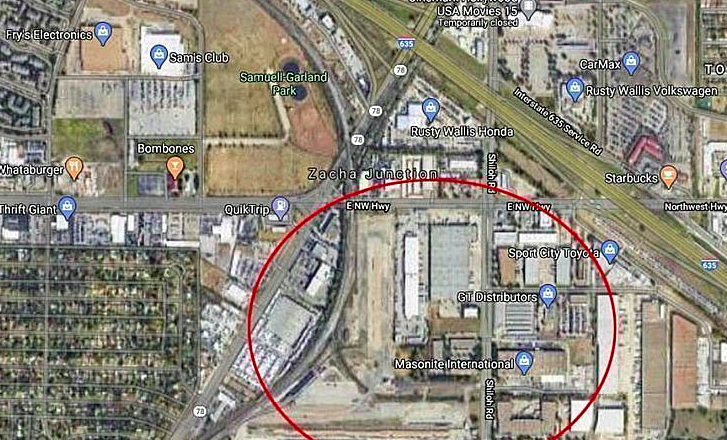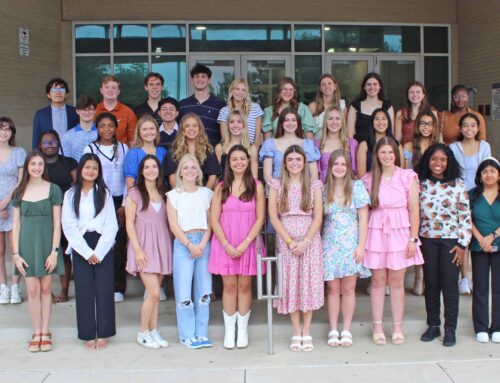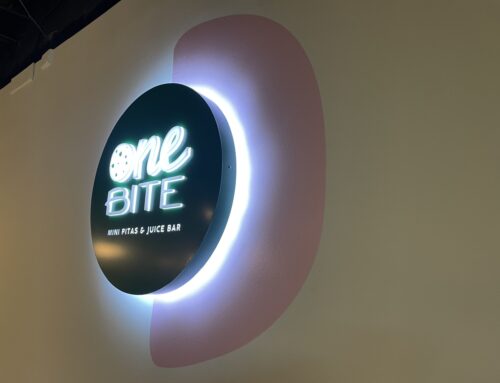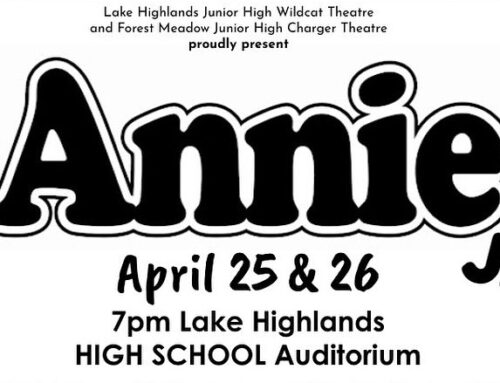
A proposal to build concrete and asphalt batch plants at Northwest Highway and Garland Road is meeting resistance from neighbors.
Neighbors concerned with proposed concrete and asphalt batch plants at Garland Road and Northwest Highway are invited to provide their input at a community Zoom meeting Tuesday.
District 9 Councilwoman Paula Blackmon is organizing the 5 p.m. meeting with consultants, including Materplan’s Dallas Cothrum, who advises individuals and businesses on land use, zoning and building permits.
The application filed with the City Plan Commission proposes creating a new subarea within a Planned Development District—zoned for manufacturing use since 1954—to construct two batch plants near Zacha Junction that, according to the document, would mix concrete and asphalt for the Texas Department of Transportation project to reconstruct and widen Interstate 635 from U.S. 75 to Interstate 30.
TxDOT awarded the project to Martin Marietta and Austin Bridge and Road.
The item was proposed at the May 27 Dallas City Council meeting after the City Plan Commission voted 13-1 to pass the motion on to the Council for consideration. The Council deferred a vote until June 24 to allow more time for community feedback. After hearing from residents, Blackmon said on June 9 that she would not support the proposal and would move to deny it at the June 24 Council meeting.
At the March 5 City Plan Commission meeting, records show that three members, including District 9 Plan Commissioner Michael Jung, toured a batch plant location operated by the applicant prior to the meeting to assist in the deliberation. Records also show that no opposition appeared at the public hearing, and Commissioner Jung made a motion for approval with several conditions, including limiting the term of the use to four years with a four-year renewal, requiring an annual emissions report and limiting stockpiles to 20 feet.
Typically, a near unanimous City Plan Commission vote for approval with no opposition at a public hearing would move through the City Council smoothly. In this case, news spread to the neighborhoods surrounding the proposed plants, and residents alerted their Council members. Deputy Mayor Pro Tem Adam McGough sided with Blackmon in opposing the project.
“In the past week, I have received numerous concerns from residents of District 10 concerning the proposed batch plant, and I share their concerns,” McGough said. “Based on the info I have at this point, the lack of community engagement and the negative responses I have received, I cannot support this project moving forward.”
More than 3,000 people have signed a petition asking the City Council to deny permits for the plant. Residents say the plant will be a visual blight on the neighborhood that reduces property values with its additional noise and truck traffic. It may also cause dust and fumes that may severely affect those with health problems or cause healthy people to become sick.
“When we’ve read what other communities have experienced it is saddening,” organizer Aimee Howden said. “In Frisco, McKinney and Houston, batch plants have proved to be a mess near neighborhoods, and the process for getting cities to properly enforce regulations has been long, bureaucratic, legalistic, political and frustrating.”
Former District 9 City Councilman Mark Clayton was among those speaking out against the plants, saying the proposal is almost identical to one the City Council voted down a year and a half ago when the plants were proposed in the Joppa area of South Dallas.
“The only difference between that case and now is the spin on how they’re trying to sell it,” Clayton said on Facebook. “It is the same applicant and the same zoning consultant, except the way they’re positioning it is that it’s for the 635 project. It isn’t. It never was. It’s a slight of hand that allows you to assume it’s a temporary plant for a temporary project. That plant will be there and will be the primary batch plant servicing the entirety of DFW for the life of its [sic] plant.”
The site of the proposed plants is located next to four miles of railroad track provided by Kansas City Southern and 10,000 feet of additional private track provided by Watco Companies. One train with 100 cars carrying 10,000 tons of aggregate keeps 417 trucks off the road with use of the rail line. That saves 26,000 tons of CO2 emissions, according to documents submitted by Masterplan.
The alternative is off-site batching with no access to the rail line, which would require 62,550 trucks to deliver materials to the site, according to the documents.
Emissions from the plants would be four times less than that of a char-grilled burger facility over the course of a year, according to a PowerPoint submitted to the City Plan Commission. Those emissions will be vented through a baghouse with cloth filters to keep the most harmful particulate matter from leaving the property line, said Melissa Fitz, vice president of environmental consultant Westward Environmental. Anything that does leave the property line is within federal standards, she said.
In the same PowerPoint, on a slide titled “Community Contribution,” Masterplan said in return for approval, Martin Marietta and Austin Bridge and Road would construct a landing strip at Samuell-Garland Park and construct new baseball infields at Winfrey Point.
Masterplan documents note the location of the proposed plants falls within an Opportunity Zone and is “clearly consistent” with the goals of Opportunity Zones designed to give tax incentives to developers to uplift neighborhoods. But many residents think locating additional heavy industry in the area diminishes neighborhood character and is not what the community wants or needs.
“The East Dallas community is an awesome, gritty, green and stubborn work-in-progress that has seen positive change in the last few years,” Clayton said. “It is one of the last affordable and desirable residential areas of Dallas. Approving this plan trades neighborhoods for net profit of people who don’t even live in the community.”
Sam Gillespie and Carol Toler contributed to this report.





